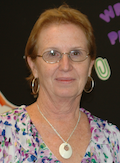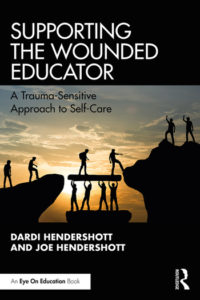Teacher Self-Care in a Time of Trauma
Supporting the Wounded Educator: A Trauma-Sensitive Approach to Self-Care
By Dardi Hendershott and Joe Hendershott
(Routledge/Eye On Education, 2020 – Learn more)

Every year teachers are faced with challenges and demands that were not addressed in their university courses; did not fit into the professional development goals for the year; or impacted their lives in ways that they never realized they would impact them.
Many of these challenges and demands must be met head on, without any training and without any hesitation.

As educators, we tend to overlook our own needs and circumstances. This, in turn, causes Compassion Fatigue (“the physical and mental exhaustion and emotional withdrawal experienced by those who care for sick or traumatized people over an extended period of time”) and burnout.
2020: A year of extreme challenges
Trauma impacts individuals, families, neighborhoods, cities and nations. We have seen this happen over and over this year with the COVID-19 health crisis. And to top it off, over the months since the coronavirus first appeared, the very character and reputation of teachers has come under fire with harsh criticism. “I am a taxpayer. ‘They’ work for me.” Teachers have been called names, bullied, and blamed for the state of the world as it is.
Supporting the Wounded Educator: A Trauma-Sensitive Approach to Self-Care is a book that is definitely needed at this time. The authors are two educators who have “been in the trenches” and know what that is all about. They share stories about their own experiences that might bring you to tears.
But their stories and their refection points do more than that – they inspire you to react and to act. They give you hope when you might feel like you are the only one feeling despair. They are not just the light at the end of the tunnel; they are holding the candles along the way to light your path.
I was a classroom teacher for 41 years, and I now continue my path as an educator working with student teachers. As I read this book, I remember walking into my class after hearing devastating news about a student or colleague, and putting it in the back of my mind, knowing that the children sitting in front of me needed me right then.
I have walked into the school building with colleagues who just lost a child or loved one, not knowing what to say, but hoping they would reach out if they needed a shoulder to cry on. I have worked with students who just lost a friend or family member to gun violence or who didn’t know where their next meal would come from.
My experiences are not unique. All educators are facing these challenges, day by day, minute by minute, and they need our support and guidance.
What you will find
Dardi and Joe Hendershott have written a book that is for all educators to read, and perhaps reread, taking notes of thoughts or responses to the questions at the end of each chapter. It is a book that could and should be shared with others during a professional development sessions, Professional Learning Community meeting/s, team meetings, or a book club.
The book is divided into several sections. The first chapter addresses the definitions of vicarious trauma, secondary trauma, compassion fatigue, and burnout which set the stage for the reader to be able to comprehend the origin and extent of the problem. The second chapter addresses the “wounded educator” and how these “wounds” impact our relationships and our job performance.
The third chapter outlines some action steps beginning with the questions: “Who are you trying to change? What are you trying to change? Why are you trying to change those things?” The fourth chapter provides some strategies and suggestions that you can apply to your professional and personal self-care.
The final chapter lays the groundwork for the reader to bring what they are learning into their educational community. What I especially enjoyed was reading the “Reading, Reflection, and Discussion Points” at the end of each chapter.
In the second half of the book, Dardi and Joe Hendershott provide practical suggestions for teachers to begin to care about themselves and show compassion for themselves. The road to self-care begins with empowering you, the reader, to set a goal or a vision for yourself and begin to appreciate what you are doing for others. Some Self-Care Strategies include:
► Journaling: As a “safe place to decompress negative emotions…write about personal aspiration as well as noteworthy positive feelings and interactions” (p.54)
► Choosing Your Words Wisely: Begin with positive self-talk
► Knowing Your Triggers: Knowing what sparks negative feelings
► Unplug: Give your mind a chance to rest
► Learn How to Say No: You don’t have to be “crazy busy” all the time
► Learn How to Say Yes: Find balance in your day and let others help you
► Realize It’s Not a Competition: Don’t compare yourself with others
► Laughter: Use humor to release tension and tap into feel-good body chemistry
The Way of the Teacher
Teaching is not just a profession. It’s a part of you. It’s a way of life. Maintaining that level of commitment is not easy in this emotionally draining world. It’s about spending summers getting ready, picking up shells on the beach (just in case you can use them in a lesson), reading children’s books so you can participate in a book club with them, looking for lessons to use so you can make your learning more meaningful, and planning ahead to differentiate for all types of learners.
As many schools struggle with the challenges of remote and hybrid teaching modes, and with the sudden changes that seem to occur every day, teachers and administrators are experiencing traumatic stress. Supporting the Wounded Educator is a valuable resource to help work though the pressures of being an educator and help regain some of that feeling of ”Hey world! Here I am! I am your teacher and I love teaching!”
After teaching fourth and fifth graders for 41 years, Linda Biondi is supervising preservice and student teachers at The College of New Jersey and Rider University. Last summer she co-facilitated a week-long writing institute in conjunction with the National Writing Project at Rider University. She volunteers for two service organizations: Homefront and Dress for Success of Central New Jersey – both have a mission to end poverty and homelessness. The mission of Dress for Success is to empower women to achieve through economic independence.


































